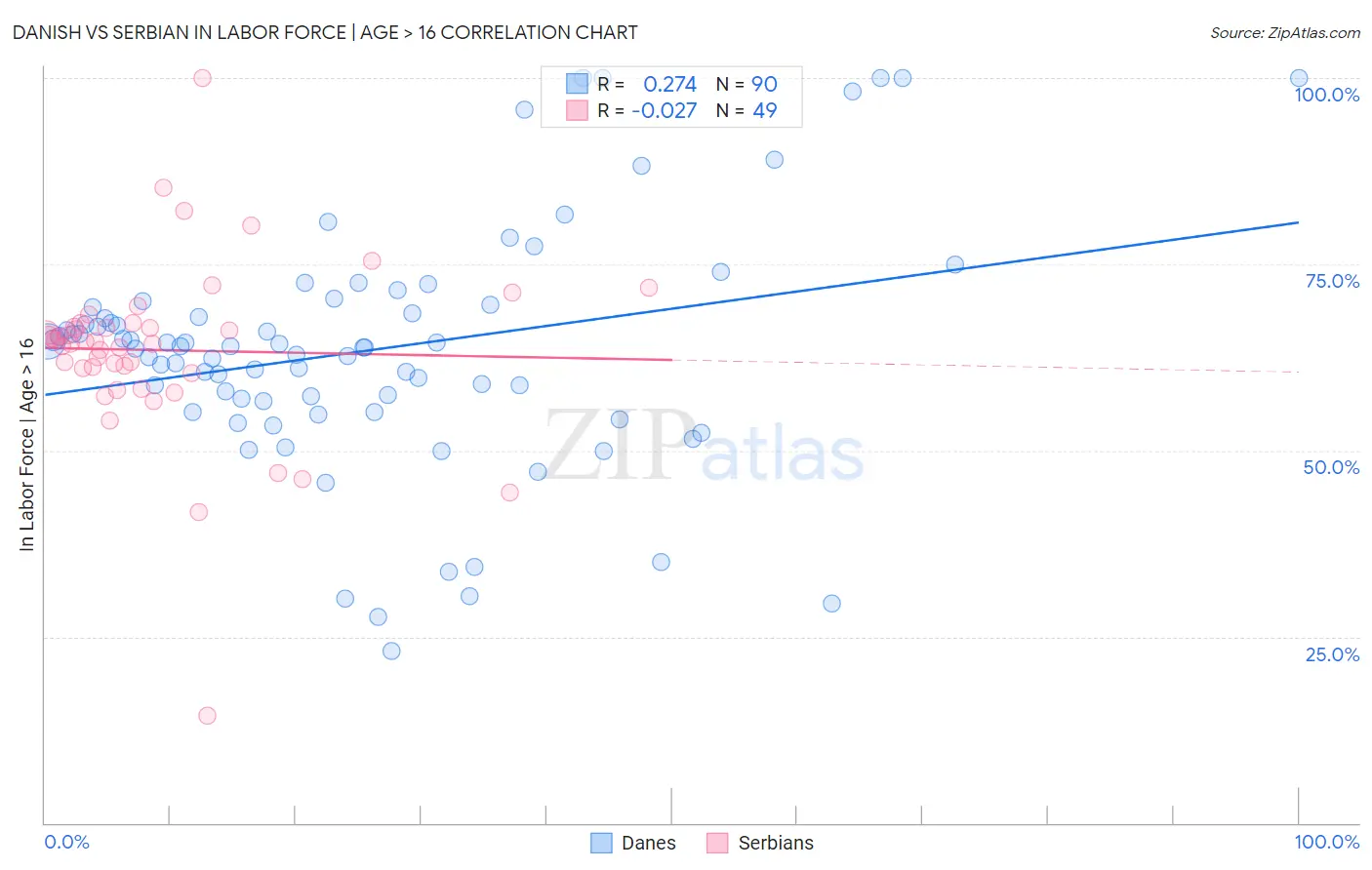Danish vs Serbian In Labor Force | Age > 16
COMPARE
Danish
Serbian
In Labor Force | Age > 16
In Labor Force | Age > 16 Comparison
Danes
Serbians
65.3%
IN LABOR FORCE | AGE > 16
68.8/ 100
METRIC RATING
164th/ 347
METRIC RANK
65.2%
IN LABOR FORCE | AGE > 16
63.5/ 100
METRIC RATING
168th/ 347
METRIC RANK
Danish vs Serbian In Labor Force | Age > 16 Correlation Chart
The statistical analysis conducted on geographies consisting of 474,191,872 people shows a weak positive correlation between the proportion of Danes and labor force participation rate among population ages 16 and over in the United States with a correlation coefficient (R) of 0.274 and weighted average of 65.3%. Similarly, the statistical analysis conducted on geographies consisting of 267,655,125 people shows no correlation between the proportion of Serbians and labor force participation rate among population ages 16 and over in the United States with a correlation coefficient (R) of -0.027 and weighted average of 65.2%, a difference of 0.070%.

In Labor Force | Age > 16 Correlation Summary
| Measurement | Danish | Serbian |
| Minimum | 23.1% | 14.4% |
| Maximum | 100.0% | 100.0% |
| Range | 76.9% | 85.6% |
| Mean | 63.4% | 63.5% |
| Median | 63.9% | 64.7% |
| Interquartile 25% (IQ1) | 56.6% | 60.8% |
| Interquartile 75% (IQ3) | 69.2% | 66.8% |
| Interquartile Range (IQR) | 12.7% | 6.1% |
| Standard Deviation (Sample) | 16.2% | 12.1% |
| Standard Deviation (Population) | 16.1% | 12.0% |
Demographics Similar to Danes and Serbians by In Labor Force | Age > 16
In terms of in labor force | age > 16, the demographic groups most similar to Danes are South African (65.3%, a difference of 0.010%), Immigrants from Kazakhstan (65.3%, a difference of 0.010%), Immigrants from Western Asia (65.3%, a difference of 0.020%), Australian (65.3%, a difference of 0.030%), and Albanian (65.3%, a difference of 0.030%). Similarly, the demographic groups most similar to Serbians are Arab (65.2%, a difference of 0.010%), Immigrants from Israel (65.2%, a difference of 0.020%), Israeli (65.2%, a difference of 0.020%), Immigrants from Belarus (65.2%, a difference of 0.030%), and Immigrants from Sweden (65.2%, a difference of 0.030%).
| Demographics | Rating | Rank | In Labor Force | Age > 16 |
| Immigrants | Ireland | 75.9 /100 | #156 | Good 65.3% |
| Immigrants | Russia | 75.7 /100 | #157 | Good 65.3% |
| Panamanians | 75.2 /100 | #158 | Good 65.3% |
| Immigrants | Syria | 74.6 /100 | #159 | Good 65.3% |
| Immigrants | South Africa | 73.5 /100 | #160 | Good 65.3% |
| Australians | 71.3 /100 | #161 | Good 65.3% |
| Albanians | 70.8 /100 | #162 | Good 65.3% |
| South Africans | 69.8 /100 | #163 | Good 65.3% |
| Danes | 68.8 /100 | #164 | Good 65.3% |
| Immigrants | Kazakhstan | 68.1 /100 | #165 | Good 65.3% |
| Immigrants | Western Asia | 67.3 /100 | #166 | Good 65.3% |
| Immigrants | Belarus | 66.0 /100 | #167 | Good 65.2% |
| Serbians | 63.5 /100 | #168 | Good 65.2% |
| Arabs | 62.4 /100 | #169 | Good 65.2% |
| Immigrants | Israel | 61.7 /100 | #170 | Good 65.2% |
| Israelis | 61.6 /100 | #171 | Good 65.2% |
| Immigrants | Sweden | 61.3 /100 | #172 | Good 65.2% |
| Immigrants | Ukraine | 53.7 /100 | #173 | Average 65.1% |
| Macedonians | 50.0 /100 | #174 | Average 65.1% |
| Nicaraguans | 49.7 /100 | #175 | Average 65.1% |
| Swedes | 47.4 /100 | #176 | Average 65.1% |